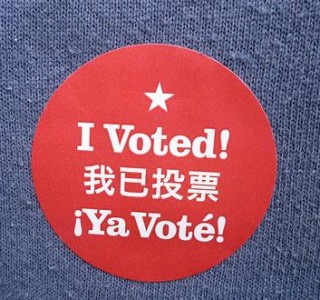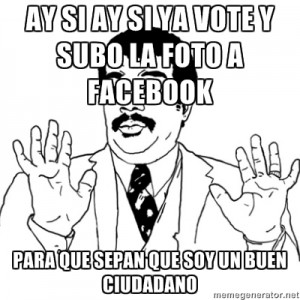Recuerdo un día hace ocho años en que me sentí como si tuviera las manos atadas. Me sentía furiosa. Frustrada. Sin voz. Sin poder.
Era un día como hoy, hace ocho años, el día de la elección general en los Estados Unidos, cuando el senador John Kerry estaba corriendo en contra del Presidente George W. Bush.
Sólo faltaban exactamente dos semanas para yo cumplir 18 años. Y no había nada que yo podía hacer.
Sin embargo, sí hice algo– hice trabajo de voluntaria con Mami, haciendo llamadas (“phone banking,”) yendo de puerta en puerta, y asistiendo a eventos en mi comunidad.

Durante las elecciones pasadas del 2008, me da vergüenza decir que no me envolví mucho. Pero voté en una elección nacional por primera vez, y fue a la vez la elección más histórica en los Estados Unidos.
Este año he recurrido más a las redes sociales. Aunque no he salido para hacer trabajo de voluntaria, siento que he aprendido más sobre la importancia del voto Latino este año que en cualquier otro año.
He asistido a conferencias grandes como LULAC y LATISM 2012, donde el papel de los Latinos en esta elección se ha reiterado mucho.
Envié mi papeleta por correo hace semanas. Me tomé el tiempo de estudiarme los candidatos y las enmiendas locales.
Me he educado sobre temas que son muy relevantes para nuestra comunidad y sobre las estadísticas asombradoras, de acuerdo a un reportaje de CNN publicado en junio:
- Actualmente, hay 50.5 millones de Latinos en los E.E.U.U.
- De acuerdo al censo del 2012, ha habido un aumento de 43 por ciento en la población Latina desde el censo del 2010.
- Se estima que 29 por ciento de la población de los E.E.U.U. serán Latinos en el año 2050.
- 59.4 por ciento de Latinos fueron votantes registrados en el 2008.
- 49.9 por ciento de Latinos votaron en la elección del 2008.
- De acuerdo a VotoLatino.org, los Latinos entre edades 18 a 25 son los menos que se han registrado para votar
¿Ven el patrón que me asusta? Si Latinos que están registrados para votar no ejercen ese derecho, nuestra ciudadanía pierde valor. Necesitamos alzar las voces.
Qué bueno que hay muchos recursos bilingües en el Internet con el motivo de educar al votante hispano. Aquí tengan algunos:
- League of United Latin American Citizens (LULAC) en inglés y español
- Latinos in Social Media, artículos sobre el voto Latino (inglés)
- Ya Es Hora, una campaña para aumentar la participación cívica de los Latinos (español)
- Conozca sus derechos como votante (inglés)
- Lista para votantes (inglés y español)
- El blog de MomsRising, una organización que apoya los derechos de mujeres y niños (inglés)
- Voto Latino, una organización imparcial enfocada en movilizando a Latinos a que voten (inglés)
Ahora que tienes todos estos recursos a tu disposición, y si ya estás registrado para votar en tu estado, no hay excusa. Hay que alzar nuestras voces. Y hay que hacerlo ahora.
I remember a day eight years ago on which I felt like I had my hands tied. I felt furious. Frustrated. Voiceless. Powerless.
It was a day like today, eight years ago, Election Day in the United States, when Senator John Kerry was running against President George W. Bush.
I was to turn 18 in exactly two weeks. And there was nothing I could do.
However, I did do something. I did volunteer work with Mami, phone banking, knocking on doors, and attending events in my community.
During the last general election four years ago, I’m ashamed to say I didn’t get as involved. But I voted in a national election for the first time, and it was the most historic election in the United States.
This year, I’ve turned more to social media. Even though I haven’t gone out to do volunteer work, I feel I have learned more about the importance of the Latino vote this year than during any other year.
I’ve been to large conferences like LULAC and LATISM ’12, where the role of Latinos in this election has been reiterated often.
I mailed my absentee ballot weeks ago. I took the time to learn about the candidates and the local amendments.
I’ve educated myself on issues that are very relevant to our community– health care, education, immigration, and voter suppression, to name a few– and on shocking statistics, according to a CNN article published in June:
- There are currently 50.5 million Latinos in the U.S.
- According to the 2012 U.S. Census, there has been a 43% increase in the Latino population since the 2012 Census.
- An estimated 29% of the U.S. population will be Latino in 2050.
- 59.4% of Latinos were registered voters in 2008.
- 49.9% of Latinos voted in the 2008 election.
- According to VotoLatino.org, Latinos between the ages of 18 and 25 are the demographic least registered to vote.
It’s a good thing there are many bilingual resources on the Internet with the purpose of educating the Latino voter. Here are a few:
- League of United Latin American Citizens (LULAC) in English and Spanish
- Latinos in Social Media, articles about the Latino vote (English)
- Ya Es Hora, a campaign to increase the civic participation of Latinos (Spanish)
- Know Your Voting Rights (English)
- Voting Checklist (English and Spanish)
- The MomsRising blog, an organization that advocates for the rights of moms and children (English)
- Voto Latino, a non-partisan organization focused on getting Latinos to vote (English)
Now that you have all these great resources at your disposal, and if you’re already registered to vote, there is simply no excuse. We have to raise our voices. And we have to do it now.


I come from a country where, more than once, our basic rights were “suspended” due to the implementation of an authoritarian government. I understand that, many times, when a country has had the luck of not having to experience such situation, its citizenry might take its regime for granted. But no country should get to such a stage to realize how important voting is, through its entire process! T
Me encanta. Thank you for this, Laurita!
I completely agree with Silvina above. My father comes from a country with an authoritarian regime and talk about frustrating. We totally take our right to vote for granted in this country.